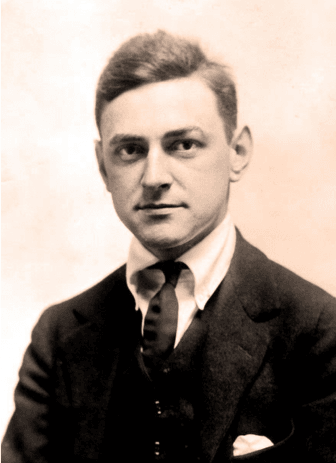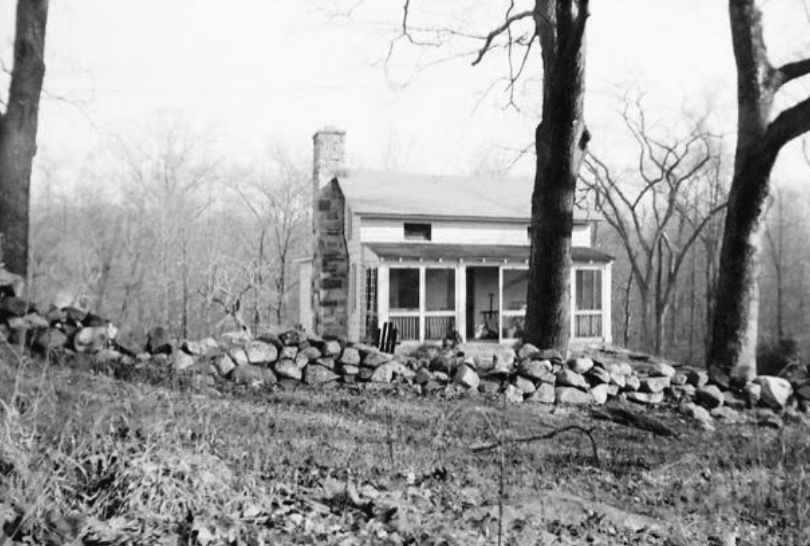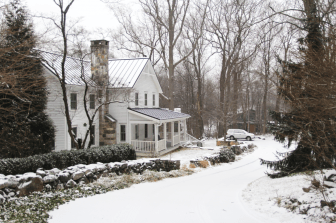Prior to Alex Bergstein’s victory in the race for State Senate 36th District last November, Horace Allen Barton was the last Democrat to hold the office.
Barton held the position from 1931-1932 during the Great Depression and most of the issues at the time were economic – even in Greenwich.
H Allen Barton, was educated at Harvard Law School and lived for decades in Greenwich where he and wife Elizabeth raised their family.
After serving as State Senator, he was appointed as counsel for the Town of Greenwich.
After Bergstein defeated incumbent Republican Scott Frantz, Abby Kamen who lives in the updated and expanded house that once belonged to the Bartons, tracked down H Allen Barton’s son David Knox Barton.

A longtime Greenwich resident and Democrat H Allen Barton was born on Feb 28, 1893. He was member of the Episcopal Church and after serving as State Senator for the 36th district from 1931-1932 was appointed town counsel for Greenwich from 1935 until 1946. He died in 1947 at the age of 54. Photo courtesy Greenwich Historical Society
“I was interested in trying to find any relatives that I could contact about the results of the election,” Kamen said, adding that she researched directories, real estate records and maps at the Greenwich Historical Society and was given the obituary of one of H Allen Barton’s sons that mentioned another surviving son, David Knox Barton.
“I had a feeling of connection to Barton since I had volunteered for Alex Bergstein’s campaign. The day after the historic win, I felt obligated to somehow let his descendants know. I wrote the telling him that I was the current owner of the house and mentioned that I had supported her and thought his dad would be pleased.”
She mailed Dave Barton an article about the historic election that mentioned his father, and included her email address. It wasn’t long before she received a reply.

The H Allen Barton’s home in 1940 on Cognewaugh Road in Cos Cob, photographed from the south of the property. Contributed photo
She also connected with Elizabeth Maida Barton Follini, Dave’s sister who goes by Maida. She recalled growing up in the small Cos Cob house which was built around 1847 on 17 acres off Cognewaugh Rd, and how her father H Allen Barton cleared trails in the woods for family walks.
“We had a wonderful life there as we not only had the small house but a barn with a horse stall at the lower level for my horse, and cars in the upper level, and a stone house my father arranged to have built, which he used for his home office,” Maida wrote. “After my father died, my mother gradually sold off plots of land to help support herself and send me through college.”

The Barton house today on Barton Lane in Cos Cob. Photo: Leslie Yager
After Mrs. Kamen connected with Dave Barton, now 91 and living in New Hampshire, Kamen put GFP in touch with him.
Reached by phone Mr. Barton recalled some of the controversies his father took a stand on.
“In 1930 I was only three years old when he was elected, but my father then and for several years read The New Republic, which took a liberal viewpoint,” Barton recalled, adding that the first election he has a strong memory of was in 1936 when Democratic President Franklin D. Roosevelt defeated Republican Governor Alf Landon of Kansas.
“My father always wanted us to be informed. Of course I was interested in that 1936 election when only Maine and Vermont voted Republican,” he said. “Alf Landon got clobbered. It was FDR’s first re election bid and he won 46 out of 48 states.”
Barton noted that Vermont has since gone from being one of the most Republican states in the US to being very liberal, and represented by Bernie Sanders in the US Senate.
Barton said he and his two siblings were brought up as New Deal Democrats. “I stayed a Democrat until Jimmy Carter. More recently, I gave up my Republican registration, right after Trump was elected,” he said, adding that he has not re-registered as a Democrat. “I’m not sure what the Democrats stand for.”
Dave Barton’s daughter Nancy Barton who was the oldest of his eight children ran for the State Senate seat in the 36th district as a Democrat in 2010, but was defeated by Republican incumbent Scott Franz. Not long after the election she died at the age of 60 following a long illness.
Reflecting on some of the issues he remembered his father was passionate about, Barton said, “He was a thorough liberal on issues of civil rights and constitutional rights.”
Barton said his father contributed his legal opinion during the Sacco and Vanzetti trial in which two Italian-born laborers were convicted of murdering a guard and a paymaster during a 1920 armed robbery in Massachusetts. Despite protests around the world, the two were executed by electrocution.
“My father was part of a group of lawyers who felt the trial had been unfair,” Barton recalled. “I remember him speaking always quite concerned about the law being used in less than an ideal way.”
“He also was quite active in terms of state politics. Connecticut was very backward in terms of family law,” he continued adding that both contraception and abortion were illegal in the state. “I think the Catholic Church had their usual anti contraception and anti abortion position. My dad was passionate about that.”
Barton said his grandfather – his father’s father – had moved from New York State to Greenwich in order to get a divorce. “At least Connecticut permitted a divorce,” he said. “And he had an excellent case.”
“In 1930, a full year after the stock market crashed, things were in pretty dreadful condition. The big issue really had to do with Hoover’s inability to react in a positive way to the needs of the population,” he said. “The long term Republican domination of the federal government I think was probably the cause of the Depression – the tariff policies and so on, and the Republicans basically lost starting in 1930 and in federal elections in 1932 for the Roosevelt era.”
Dave Barton, whose birth was right around the time of the stock market crash, noted that the Depression continued through the 1930s, and that his father supported the New Deal.
“Even in Greenwich there were people suffering economically. My mother’s family in Rye were rock-ribbed Republicans,” he said. “They lost most of their income, which was a severe blow to my father. I’m sure he was glad to have whatever contributions they made to my mother for family finances. That stream of income shut off in 1929.”
On the topic of Anti-Semitism, which accelerated in the 1930’s, Barton said his father led by example.
“At one point there was a guy who became well known and respected, and became a judge. His name was Archie Tunick. He was a lawyer and his brother was a doctor,” Barton recalled. “My father basically helped Archie Tunick become an accepted member of the Greenwich legal community. There were not too many Jewish lawyers at the time.”
“My father was very friendly to him and helpful to him,” he added. “I think they shared an office on the Avenue.”
“Archie and his brother Dr. Tunick became quite well known and respected as time went by, but it was not an easy thing,” Barton said.
Archibald Tunick, who served as a State Representative and later become a Connecticut Superior Court judge, died in 1990 at the age of 82. For a time he was the Greenwich’s assistant prosecutor. That was before the circuit court replaced Town courts.
Barton said some time in the late 1930s, after his term as State Senator, his father was appointed as Town Counsel for Greenwich.
“I think I have always suspected that was done to keep him quiet so he wasn’t a source of annoyance to the local administration, which had a very conservative Republican viewpoint,” Barton recalled. “As Town Counsel, I think he felt he couldn’t take any extreme political positions and went through the rest of this life having to bite his tongue.”
Barton said his father retired from that job around 1946 and then undertook to rebuild his private legal business.
Barton said he joined the Army from roughly 1946 to 1948 so his father H Allen Barton wouldn’t have to support his large college bill.
“At that point it was $400 a year at Harvard. It (the Army) was a great experience because I had three years of college already. They put me to work as an engineer on the radar system,” he said with a hint to his future career.
Barton finished Harvard in 1949 but was included with the class of 1948.
H. Allen Barton was a member of the Merritt Parkway Commission from its formation in 1935 until 1942.
Dave said he clearly remembers his father’s participation on the commission, which he noted was partially financed by the Works Project Administration. The design of each of the many bridges over the parkway was assigned to a different architect as a way of maintaining employment for them.
“My father lamented the fact that the east- and west-bound two-lane portion of the roadway, which were separated by a grassy strip, had to be pinched together under each bridge to avoid the expense of building longer bridges or supporting the bridge with center pillars,” he said.
The project was about 20 years in the making and many Fairfield County residents were eager to divert the faster moving passenger traffic from the Boston Post Road (Rte 1).
Barton recalled how the original section of the parkway ran from the New York state line on the western border of Connecticut to West Rock where it stopped.
“The rocky ridge blocked the route into and past New Haven. When the Wilbur Cross Parkway was built to extend the Merritt, they had to drill a tunnel under West Rock,” he said. Today the West Rock Tunnel is also called Heroes Tunnel.
“I can remember waking up on summer mornings to hear the construction equipment for the Parkway, which was only a mile or two north of our house on Cognewaugh Road,” Barton recalled. “Later, I remember hitchhiking to and from Harvard, using the Parkway and getting on or off at a particular bridge that connected with Stanwich Road and then to Cognewaugh Road.”
The Merritt was formally opened on Labor Day, 1940. It was the state’s first parkway.
Barton said another controversy that divided the Town was whether or not to purchase Tod’s Point, and his father H Allen Barton had a strong opinion.
“My father was one of the leaders in favor of the Town buying Tod’s Point,” Barton said. “But there was a lot of opposition. People said the town already owned Island Beach.”
In 1918 two families – the Lauders and the Greenways – had bought the island and donated it to the Town for $1.00 in memory of George Lauder, Jr who died at just 37 during the influenza epidemic that year. The 100 year anniversary of the town purchasing Island Beach took place last summer.
Of course, the Town ultimately did purchase Tod’s Point, but it was several years in the making.
Barton said that four or five years before the decision, his family had enjoyed privileged access passes to the beach.
“As an attempt to bring my father in to support the purchase, my father was given a pass that we could use to go to the beach and use a small bath house. Not more than 100 people had access to the beach then,” Barton said. “It was absolutely uncrowded.”
On January 10, 1945, the Town of Greenwich purchased Tod’s Point.
Barton said that his mother, an artist who painted landscapes, had painted a picture of the air defense civilian-manned lookout tower near the causeway at Tod’s Point, and that after the war, in about 1946, she volunteered as a civilian observer at the tower.
“She had trouble sleeping and took the early morning shift from 4:00am until 6:00 or 8:00am to do airplane spotting. This was before radar defenses,” Barton said. “She was one of the civilian observers who would report on any airplane that flew over.”
Barton said he attended Brunswick for first grade, then public school at North Mianus, before getting a scholarship to Edgewood School on Glenville Rd beginning in 8th grade and through his high school years.
“In 1938 my father arranged scholarships for me and my brother, and transferred us to the Edgewood School. It was a good progressive private school that was John Dewey oriented.”
Barton said that on weekends he and his brother would ride their bikes to Edgewood School to help publish the school newspaper.
In 1946, Barton said his father advocated for bringing the United Nations to Greenwich.
“My father was in favor of the UN being invited in. The Town was opposed.”
Barton said at that time there was a real push for the federal government use eminent domain to take a large enough area for the UN, roughly 40+ square miles.
“The basic discussion I think had to do with the area including Banksville, Round Hill and Stanwich – that whole stretch of upland Greenwich bordering Merritt Parkway,” he said. “It was a NIMBY situation.”
An article from the Oswego Palladian-Times, on Feb 6, 1946 describes “tempestuous” meetings of Stamford and Greenwich property owners – one in the Greenwich High School auditorium and one at the Willard School in Stamford.
In Greenwich a resolution was adopted in opposition to the UN, and attached to the resolution was an amendment authorizing a referendum to go before the town’s 20,000 voters.
In Stamford the vote was a tie.
“Both meetings were punctuated by applause, cheering and boos. At Greenwich the action was taken despite advice from Town Counsel H. Allen Barton that the legality of the procedures was ‘dubious,'” the article stated.
H Allen Barton’s life however was cut short. In 1946 during the course of arguing a case in court he suffered a fatal cerebral hemorrhage and died the following night. He was only 53.
“He was not in healthy condition,” Barton said. “He didn’t take very good care of his diet and drank fairly heavily, which was part of a legal tradition at the time – going out for drinks with the legal community.”
Today in his retirement community in New Hampshire, Barton said he is mostly quiet about his history and his politics.
“They would be be surprised to know my last 15 to 20 years were spent working as a contractor for the CIA on issues of foreign technology, especially radar.”
“It’s a source of great embarrassment to have spent the past 60 years working to make sure that the Russians didn’t take over the world and all of a sudden have a President who prefers the company of Putin to his own security advisors,” he said, adding, of President Trump, “He doesn’t have the feeling to be embarrassed, but most of his followers are pretty appalled at his activities. But most won’t admit it.”

The H Allen Barton’s home in 1940 on Cognewaugh Road in Cos Cob, photographed from the south of the property. Contributed photo